Finance Law: Analysis of Bank Regulations and Licensing
VerifiedAdded on 2021/06/15
|16
|4625
|86
Report
AI Summary
This report delves into the realm of finance law, with a specific focus on the definition of a bank and the necessity of stringent legal regulations within the banking sector. It differentiates banks from other financial institutions, highlighting the unique ability of banks to accept public deposits and the implications of this distinction. The report examines the importance of banking regulations, including licensing and supervision, and their role in maintaining financial stability. It explores the components of financial law, including self-regulating practices and case laws. The report discusses the 'too big to fail' concept and its impact on government intervention, as well as the rationale behind banking regulations, such as risk reduction and prevention of misuse. It analyzes the licensing process, supervision mechanisms, and the role of regulators in enforcing capital requirements, reserve requirements, and corporate governance. The report aims to provide a comprehensive understanding of the regulatory framework governing banks and financial institutions.
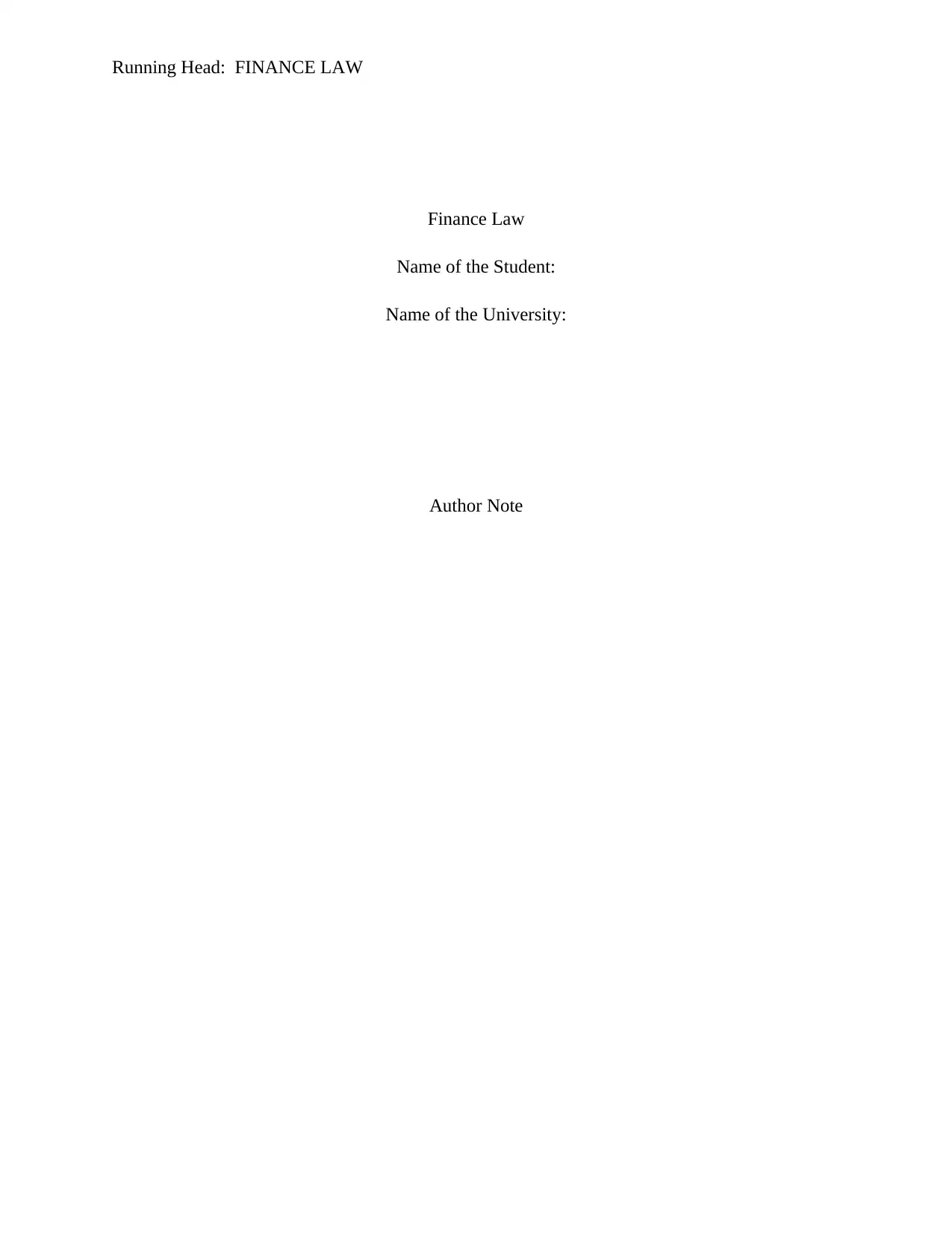
Running Head: FINANCE LAW
Finance Law
Name of the Student:
Name of the University:
Author Note
Finance Law
Name of the Student:
Name of the University:
Author Note
Paraphrase This Document
Need a fresh take? Get an instant paraphrase of this document with our AI Paraphraser
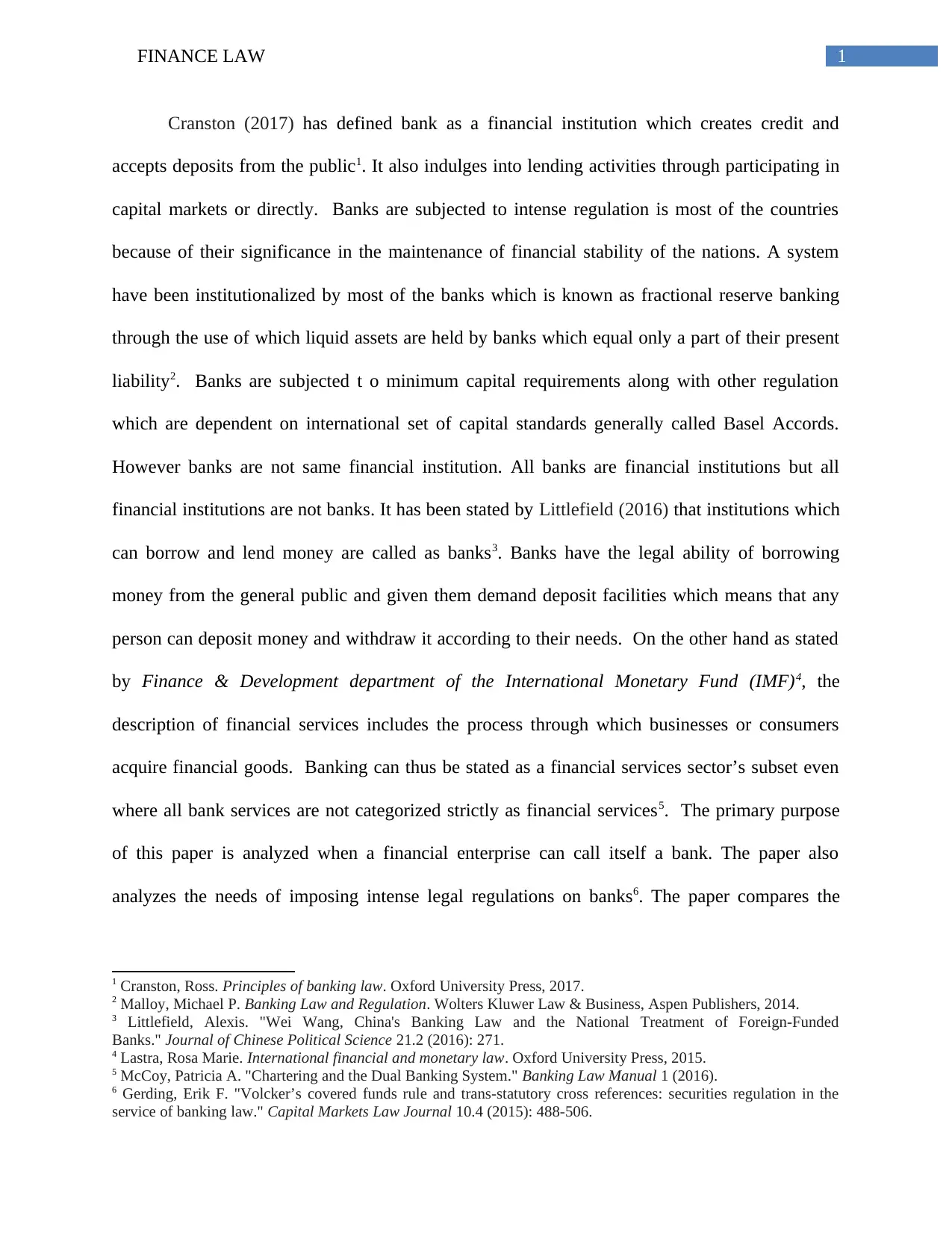
1FINANCE LAW
Cranston (2017) has defined bank as a financial institution which creates credit and
accepts deposits from the public1. It also indulges into lending activities through participating in
capital markets or directly. Banks are subjected to intense regulation is most of the countries
because of their significance in the maintenance of financial stability of the nations. A system
have been institutionalized by most of the banks which is known as fractional reserve banking
through the use of which liquid assets are held by banks which equal only a part of their present
liability2. Banks are subjected t o minimum capital requirements along with other regulation
which are dependent on international set of capital standards generally called Basel Accords.
However banks are not same financial institution. All banks are financial institutions but all
financial institutions are not banks. It has been stated by Littlefield (2016) that institutions which
can borrow and lend money are called as banks3. Banks have the legal ability of borrowing
money from the general public and given them demand deposit facilities which means that any
person can deposit money and withdraw it according to their needs. On the other hand as stated
by Finance & Development department of the International Monetary Fund (IMF)4, the
description of financial services includes the process through which businesses or consumers
acquire financial goods. Banking can thus be stated as a financial services sector’s subset even
where all bank services are not categorized strictly as financial services5. The primary purpose
of this paper is analyzed when a financial enterprise can call itself a bank. The paper also
analyzes the needs of imposing intense legal regulations on banks6. The paper compares the
1 Cranston, Ross. Principles of banking law. Oxford University Press, 2017.
2 Malloy, Michael P. Banking Law and Regulation. Wolters Kluwer Law & Business, Aspen Publishers, 2014.
3 Littlefield, Alexis. "Wei Wang, China's Banking Law and the National Treatment of Foreign-Funded
Banks." Journal of Chinese Political Science 21.2 (2016): 271.
4 Lastra, Rosa Marie. International financial and monetary law. Oxford University Press, 2015.
5 McCoy, Patricia A. "Chartering and the Dual Banking System." Banking Law Manual 1 (2016).
6 Gerding, Erik F. "Volcker’s covered funds rule and trans-statutory cross references: securities regulation in the
service of banking law." Capital Markets Law Journal 10.4 (2015): 488-506.
Cranston (2017) has defined bank as a financial institution which creates credit and
accepts deposits from the public1. It also indulges into lending activities through participating in
capital markets or directly. Banks are subjected to intense regulation is most of the countries
because of their significance in the maintenance of financial stability of the nations. A system
have been institutionalized by most of the banks which is known as fractional reserve banking
through the use of which liquid assets are held by banks which equal only a part of their present
liability2. Banks are subjected t o minimum capital requirements along with other regulation
which are dependent on international set of capital standards generally called Basel Accords.
However banks are not same financial institution. All banks are financial institutions but all
financial institutions are not banks. It has been stated by Littlefield (2016) that institutions which
can borrow and lend money are called as banks3. Banks have the legal ability of borrowing
money from the general public and given them demand deposit facilities which means that any
person can deposit money and withdraw it according to their needs. On the other hand as stated
by Finance & Development department of the International Monetary Fund (IMF)4, the
description of financial services includes the process through which businesses or consumers
acquire financial goods. Banking can thus be stated as a financial services sector’s subset even
where all bank services are not categorized strictly as financial services5. The primary purpose
of this paper is analyzed when a financial enterprise can call itself a bank. The paper also
analyzes the needs of imposing intense legal regulations on banks6. The paper compares the
1 Cranston, Ross. Principles of banking law. Oxford University Press, 2017.
2 Malloy, Michael P. Banking Law and Regulation. Wolters Kluwer Law & Business, Aspen Publishers, 2014.
3 Littlefield, Alexis. "Wei Wang, China's Banking Law and the National Treatment of Foreign-Funded
Banks." Journal of Chinese Political Science 21.2 (2016): 271.
4 Lastra, Rosa Marie. International financial and monetary law. Oxford University Press, 2015.
5 McCoy, Patricia A. "Chartering and the Dual Banking System." Banking Law Manual 1 (2016).
6 Gerding, Erik F. "Volcker’s covered funds rule and trans-statutory cross references: securities regulation in the
service of banking law." Capital Markets Law Journal 10.4 (2015): 488-506.
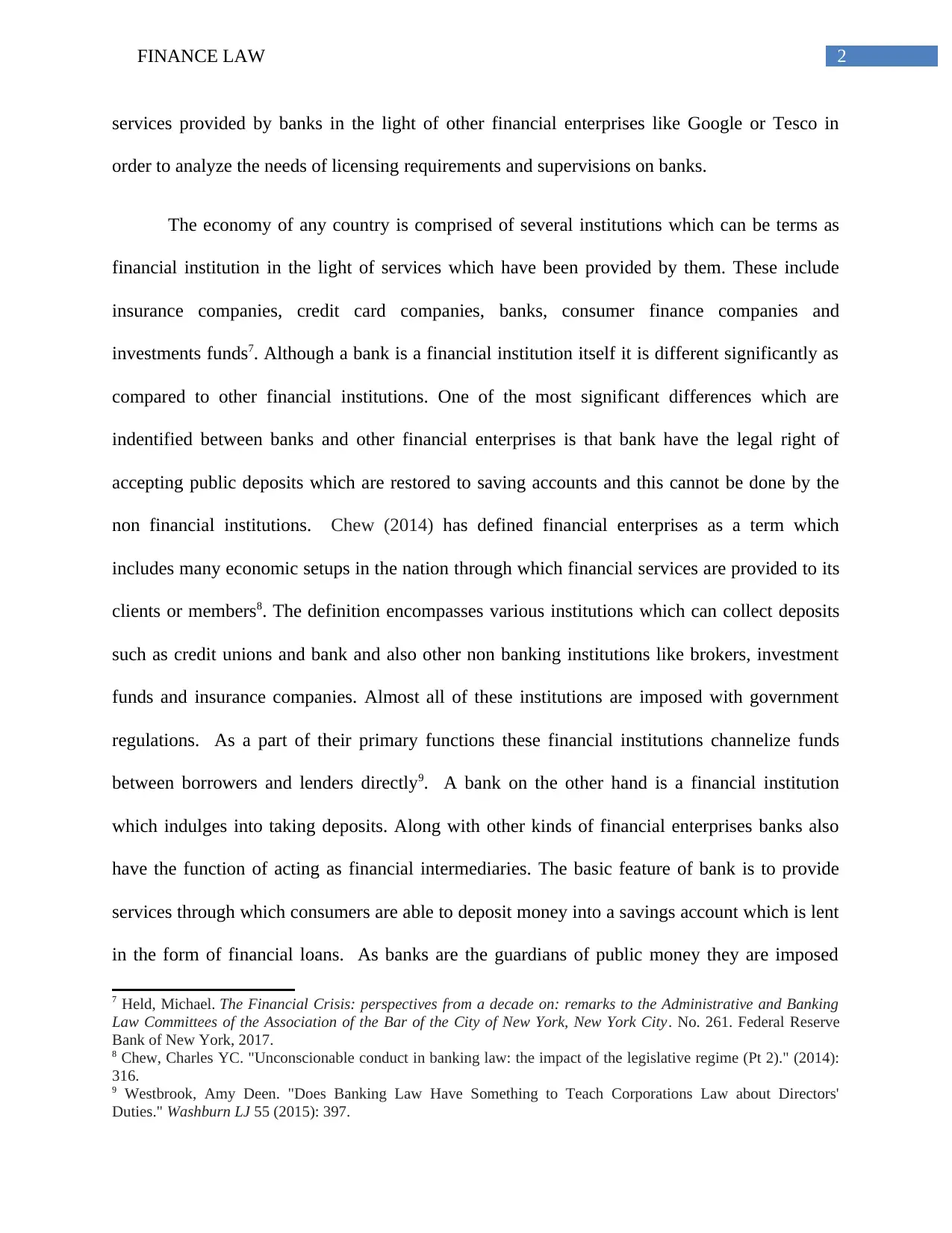
2FINANCE LAW
services provided by banks in the light of other financial enterprises like Google or Tesco in
order to analyze the needs of licensing requirements and supervisions on banks.
The economy of any country is comprised of several institutions which can be terms as
financial institution in the light of services which have been provided by them. These include
insurance companies, credit card companies, banks, consumer finance companies and
investments funds7. Although a bank is a financial institution itself it is different significantly as
compared to other financial institutions. One of the most significant differences which are
indentified between banks and other financial enterprises is that bank have the legal right of
accepting public deposits which are restored to saving accounts and this cannot be done by the
non financial institutions. Chew (2014) has defined financial enterprises as a term which
includes many economic setups in the nation through which financial services are provided to its
clients or members8. The definition encompasses various institutions which can collect deposits
such as credit unions and bank and also other non banking institutions like brokers, investment
funds and insurance companies. Almost all of these institutions are imposed with government
regulations. As a part of their primary functions these financial institutions channelize funds
between borrowers and lenders directly9. A bank on the other hand is a financial institution
which indulges into taking deposits. Along with other kinds of financial enterprises banks also
have the function of acting as financial intermediaries. The basic feature of bank is to provide
services through which consumers are able to deposit money into a savings account which is lent
in the form of financial loans. As banks are the guardians of public money they are imposed
7 Held, Michael. The Financial Crisis: perspectives from a decade on: remarks to the Administrative and Banking
Law Committees of the Association of the Bar of the City of New York, New York City. No. 261. Federal Reserve
Bank of New York, 2017.
8 Chew, Charles YC. "Unconscionable conduct in banking law: the impact of the legislative regime (Pt 2)." (2014):
316.
9 Westbrook, Amy Deen. "Does Banking Law Have Something to Teach Corporations Law about Directors'
Duties." Washburn LJ 55 (2015): 397.
services provided by banks in the light of other financial enterprises like Google or Tesco in
order to analyze the needs of licensing requirements and supervisions on banks.
The economy of any country is comprised of several institutions which can be terms as
financial institution in the light of services which have been provided by them. These include
insurance companies, credit card companies, banks, consumer finance companies and
investments funds7. Although a bank is a financial institution itself it is different significantly as
compared to other financial institutions. One of the most significant differences which are
indentified between banks and other financial enterprises is that bank have the legal right of
accepting public deposits which are restored to saving accounts and this cannot be done by the
non financial institutions. Chew (2014) has defined financial enterprises as a term which
includes many economic setups in the nation through which financial services are provided to its
clients or members8. The definition encompasses various institutions which can collect deposits
such as credit unions and bank and also other non banking institutions like brokers, investment
funds and insurance companies. Almost all of these institutions are imposed with government
regulations. As a part of their primary functions these financial institutions channelize funds
between borrowers and lenders directly9. A bank on the other hand is a financial institution
which indulges into taking deposits. Along with other kinds of financial enterprises banks also
have the function of acting as financial intermediaries. The basic feature of bank is to provide
services through which consumers are able to deposit money into a savings account which is lent
in the form of financial loans. As banks are the guardians of public money they are imposed
7 Held, Michael. The Financial Crisis: perspectives from a decade on: remarks to the Administrative and Banking
Law Committees of the Association of the Bar of the City of New York, New York City. No. 261. Federal Reserve
Bank of New York, 2017.
8 Chew, Charles YC. "Unconscionable conduct in banking law: the impact of the legislative regime (Pt 2)." (2014):
316.
9 Westbrook, Amy Deen. "Does Banking Law Have Something to Teach Corporations Law about Directors'
Duties." Washburn LJ 55 (2015): 397.
⊘ This is a preview!⊘
Do you want full access?
Subscribe today to unlock all pages.

Trusted by 1+ million students worldwide
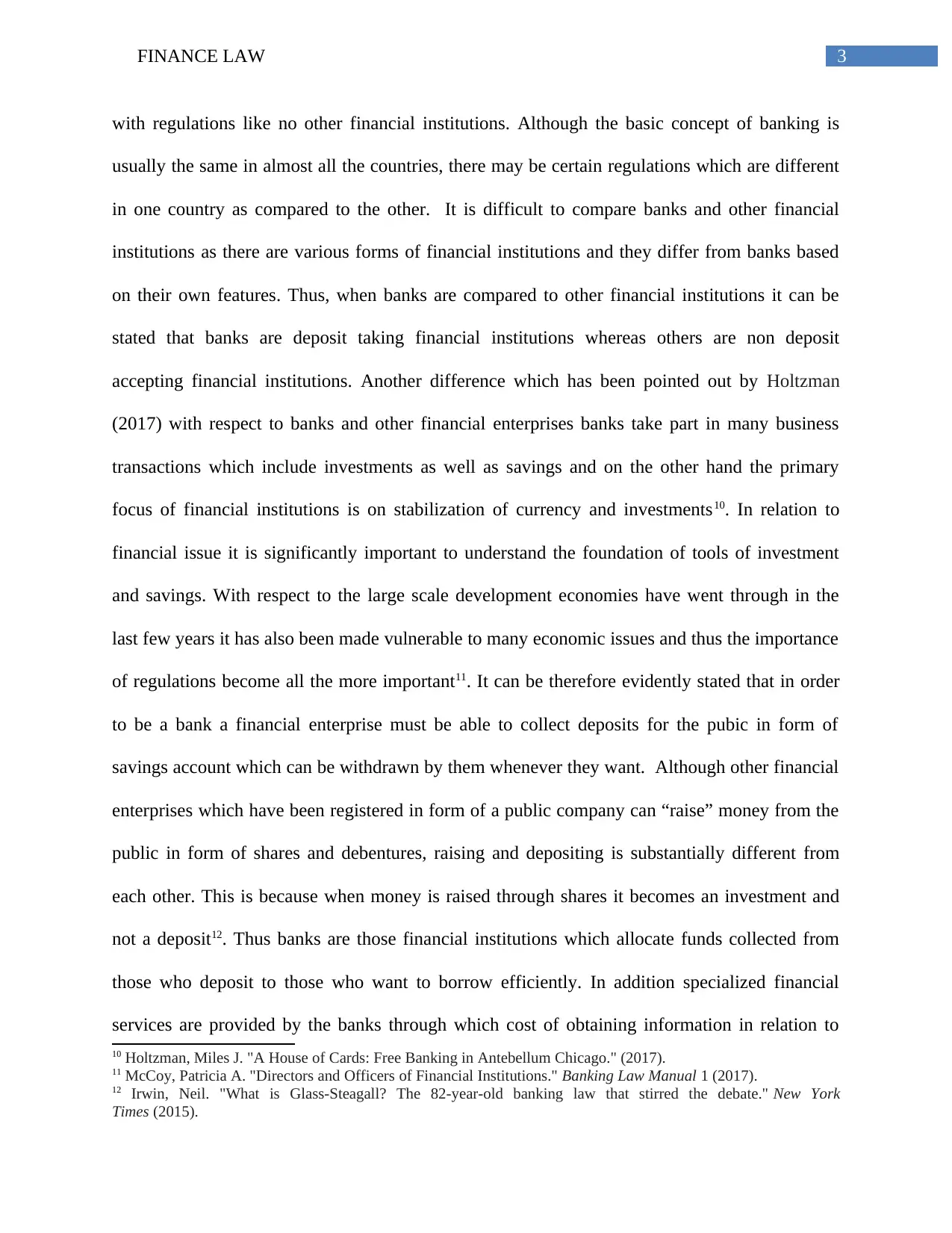
3FINANCE LAW
with regulations like no other financial institutions. Although the basic concept of banking is
usually the same in almost all the countries, there may be certain regulations which are different
in one country as compared to the other. It is difficult to compare banks and other financial
institutions as there are various forms of financial institutions and they differ from banks based
on their own features. Thus, when banks are compared to other financial institutions it can be
stated that banks are deposit taking financial institutions whereas others are non deposit
accepting financial institutions. Another difference which has been pointed out by Holtzman
(2017) with respect to banks and other financial enterprises banks take part in many business
transactions which include investments as well as savings and on the other hand the primary
focus of financial institutions is on stabilization of currency and investments10. In relation to
financial issue it is significantly important to understand the foundation of tools of investment
and savings. With respect to the large scale development economies have went through in the
last few years it has also been made vulnerable to many economic issues and thus the importance
of regulations become all the more important11. It can be therefore evidently stated that in order
to be a bank a financial enterprise must be able to collect deposits for the pubic in form of
savings account which can be withdrawn by them whenever they want. Although other financial
enterprises which have been registered in form of a public company can “raise” money from the
public in form of shares and debentures, raising and depositing is substantially different from
each other. This is because when money is raised through shares it becomes an investment and
not a deposit12. Thus banks are those financial institutions which allocate funds collected from
those who deposit to those who want to borrow efficiently. In addition specialized financial
services are provided by the banks through which cost of obtaining information in relation to
10 Holtzman, Miles J. "A House of Cards: Free Banking in Antebellum Chicago." (2017).
11 McCoy, Patricia A. "Directors and Officers of Financial Institutions." Banking Law Manual 1 (2017).
12 Irwin, Neil. "What is Glass-Steagall? The 82-year-old banking law that stirred the debate." New York
Times (2015).
with regulations like no other financial institutions. Although the basic concept of banking is
usually the same in almost all the countries, there may be certain regulations which are different
in one country as compared to the other. It is difficult to compare banks and other financial
institutions as there are various forms of financial institutions and they differ from banks based
on their own features. Thus, when banks are compared to other financial institutions it can be
stated that banks are deposit taking financial institutions whereas others are non deposit
accepting financial institutions. Another difference which has been pointed out by Holtzman
(2017) with respect to banks and other financial enterprises banks take part in many business
transactions which include investments as well as savings and on the other hand the primary
focus of financial institutions is on stabilization of currency and investments10. In relation to
financial issue it is significantly important to understand the foundation of tools of investment
and savings. With respect to the large scale development economies have went through in the
last few years it has also been made vulnerable to many economic issues and thus the importance
of regulations become all the more important11. It can be therefore evidently stated that in order
to be a bank a financial enterprise must be able to collect deposits for the pubic in form of
savings account which can be withdrawn by them whenever they want. Although other financial
enterprises which have been registered in form of a public company can “raise” money from the
public in form of shares and debentures, raising and depositing is substantially different from
each other. This is because when money is raised through shares it becomes an investment and
not a deposit12. Thus banks are those financial institutions which allocate funds collected from
those who deposit to those who want to borrow efficiently. In addition specialized financial
services are provided by the banks through which cost of obtaining information in relation to
10 Holtzman, Miles J. "A House of Cards: Free Banking in Antebellum Chicago." (2017).
11 McCoy, Patricia A. "Directors and Officers of Financial Institutions." Banking Law Manual 1 (2017).
12 Irwin, Neil. "What is Glass-Steagall? The 82-year-old banking law that stirred the debate." New York
Times (2015).
Paraphrase This Document
Need a fresh take? Get an instant paraphrase of this document with our AI Paraphraser
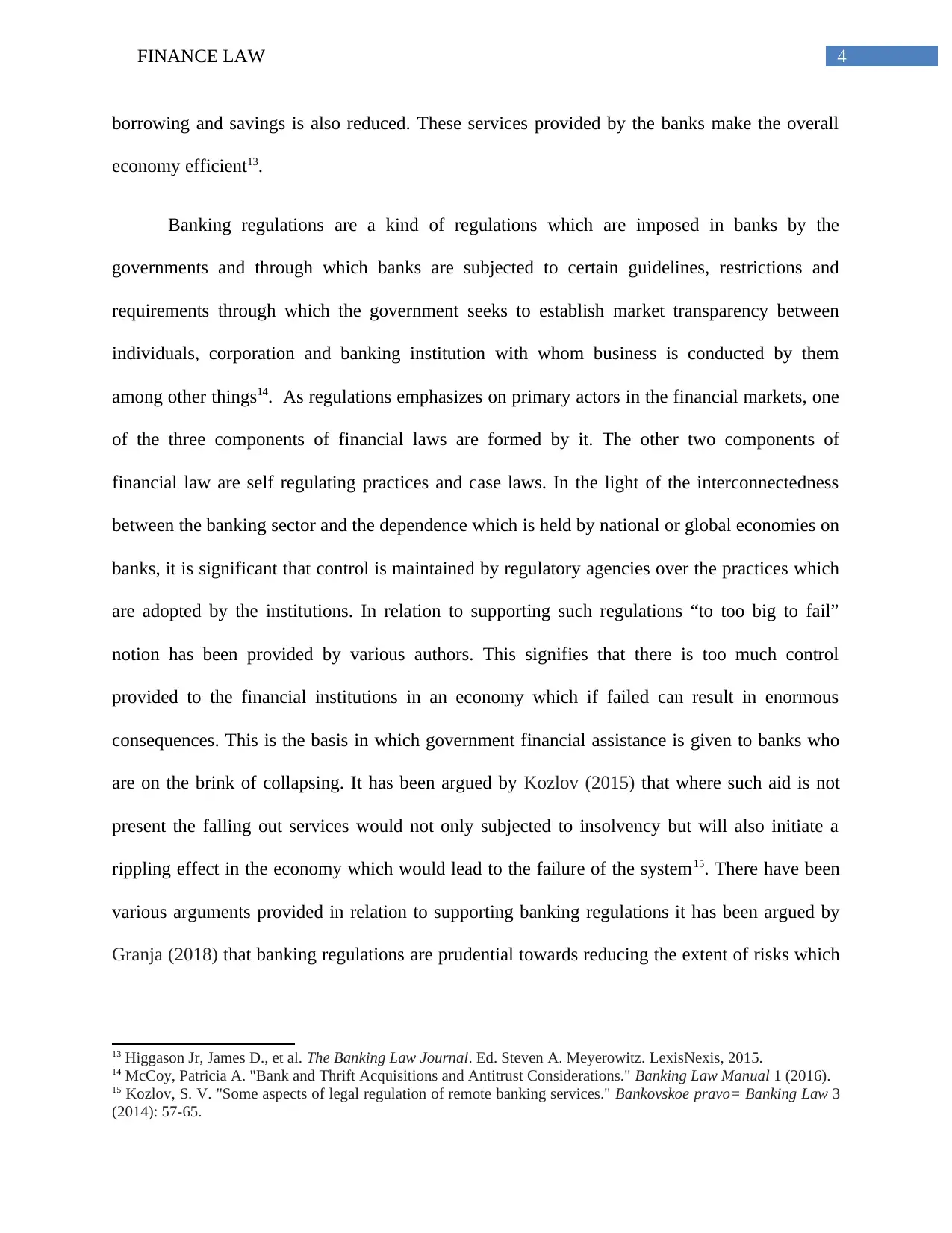
4FINANCE LAW
borrowing and savings is also reduced. These services provided by the banks make the overall
economy efficient13.
Banking regulations are a kind of regulations which are imposed in banks by the
governments and through which banks are subjected to certain guidelines, restrictions and
requirements through which the government seeks to establish market transparency between
individuals, corporation and banking institution with whom business is conducted by them
among other things14. As regulations emphasizes on primary actors in the financial markets, one
of the three components of financial laws are formed by it. The other two components of
financial law are self regulating practices and case laws. In the light of the interconnectedness
between the banking sector and the dependence which is held by national or global economies on
banks, it is significant that control is maintained by regulatory agencies over the practices which
are adopted by the institutions. In relation to supporting such regulations “to too big to fail”
notion has been provided by various authors. This signifies that there is too much control
provided to the financial institutions in an economy which if failed can result in enormous
consequences. This is the basis in which government financial assistance is given to banks who
are on the brink of collapsing. It has been argued by Kozlov (2015) that where such aid is not
present the falling out services would not only subjected to insolvency but will also initiate a
rippling effect in the economy which would lead to the failure of the system15. There have been
various arguments provided in relation to supporting banking regulations it has been argued by
Granja (2018) that banking regulations are prudential towards reducing the extent of risks which
13 Higgason Jr, James D., et al. The Banking Law Journal. Ed. Steven A. Meyerowitz. LexisNexis, 2015.
14 McCoy, Patricia A. "Bank and Thrift Acquisitions and Antitrust Considerations." Banking Law Manual 1 (2016).
15 Kozlov, S. V. "Some aspects of legal regulation of remote banking services." Bankovskoe pravo= Banking Law 3
(2014): 57-65.
borrowing and savings is also reduced. These services provided by the banks make the overall
economy efficient13.
Banking regulations are a kind of regulations which are imposed in banks by the
governments and through which banks are subjected to certain guidelines, restrictions and
requirements through which the government seeks to establish market transparency between
individuals, corporation and banking institution with whom business is conducted by them
among other things14. As regulations emphasizes on primary actors in the financial markets, one
of the three components of financial laws are formed by it. The other two components of
financial law are self regulating practices and case laws. In the light of the interconnectedness
between the banking sector and the dependence which is held by national or global economies on
banks, it is significant that control is maintained by regulatory agencies over the practices which
are adopted by the institutions. In relation to supporting such regulations “to too big to fail”
notion has been provided by various authors. This signifies that there is too much control
provided to the financial institutions in an economy which if failed can result in enormous
consequences. This is the basis in which government financial assistance is given to banks who
are on the brink of collapsing. It has been argued by Kozlov (2015) that where such aid is not
present the falling out services would not only subjected to insolvency but will also initiate a
rippling effect in the economy which would lead to the failure of the system15. There have been
various arguments provided in relation to supporting banking regulations it has been argued by
Granja (2018) that banking regulations are prudential towards reducing the extent of risks which
13 Higgason Jr, James D., et al. The Banking Law Journal. Ed. Steven A. Meyerowitz. LexisNexis, 2015.
14 McCoy, Patricia A. "Bank and Thrift Acquisitions and Antitrust Considerations." Banking Law Manual 1 (2016).
15 Kozlov, S. V. "Some aspects of legal regulation of remote banking services." Bankovskoe pravo= Banking Law 3
(2014): 57-65.
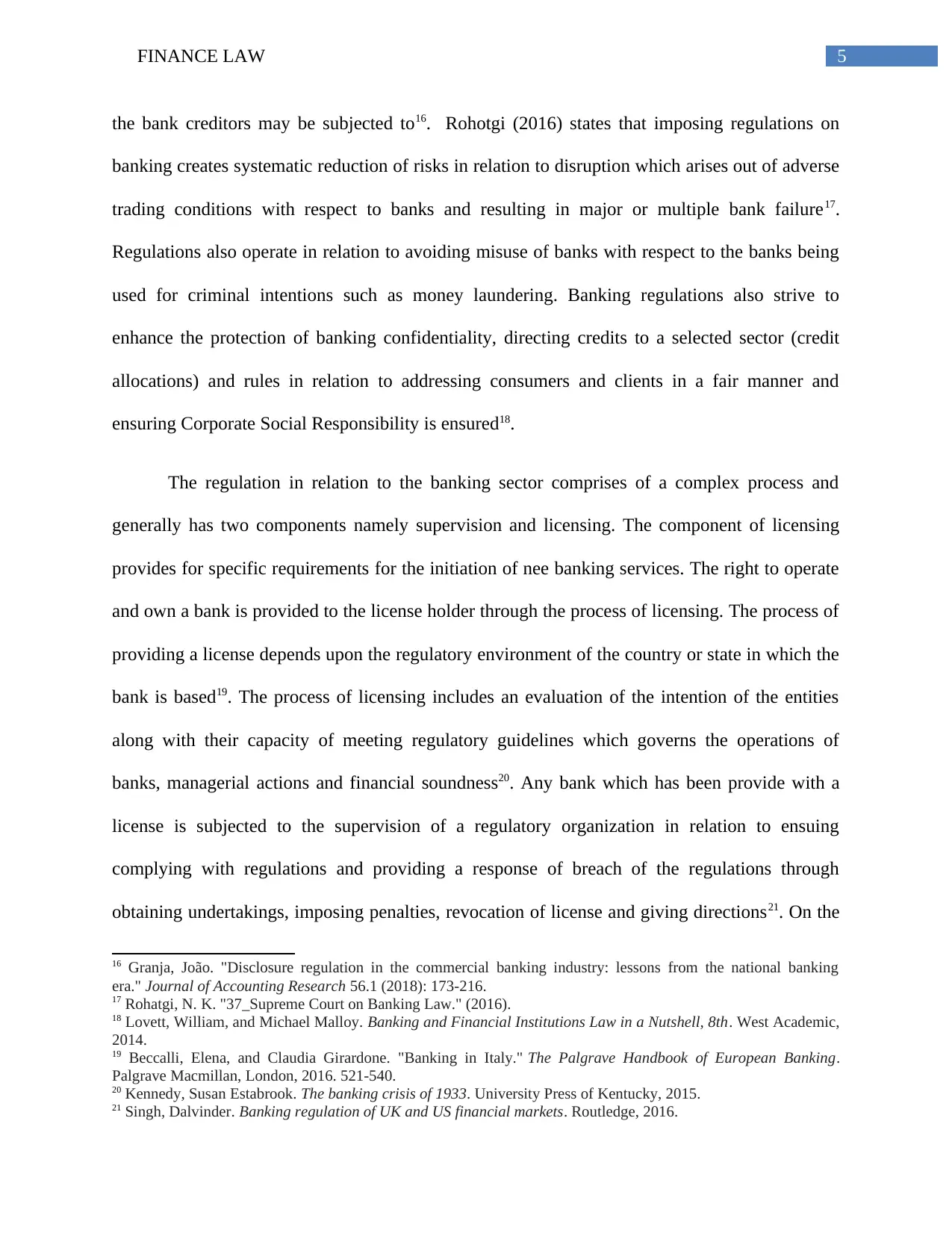
5FINANCE LAW
the bank creditors may be subjected to16. Rohotgi (2016) states that imposing regulations on
banking creates systematic reduction of risks in relation to disruption which arises out of adverse
trading conditions with respect to banks and resulting in major or multiple bank failure17.
Regulations also operate in relation to avoiding misuse of banks with respect to the banks being
used for criminal intentions such as money laundering. Banking regulations also strive to
enhance the protection of banking confidentiality, directing credits to a selected sector (credit
allocations) and rules in relation to addressing consumers and clients in a fair manner and
ensuring Corporate Social Responsibility is ensured18.
The regulation in relation to the banking sector comprises of a complex process and
generally has two components namely supervision and licensing. The component of licensing
provides for specific requirements for the initiation of nee banking services. The right to operate
and own a bank is provided to the license holder through the process of licensing. The process of
providing a license depends upon the regulatory environment of the country or state in which the
bank is based19. The process of licensing includes an evaluation of the intention of the entities
along with their capacity of meeting regulatory guidelines which governs the operations of
banks, managerial actions and financial soundness20. Any bank which has been provide with a
license is subjected to the supervision of a regulatory organization in relation to ensuing
complying with regulations and providing a response of breach of the regulations through
obtaining undertakings, imposing penalties, revocation of license and giving directions21. On the
16 Granja, João. "Disclosure regulation in the commercial banking industry: lessons from the national banking
era." Journal of Accounting Research 56.1 (2018): 173-216.
17 Rohatgi, N. K. "37_Supreme Court on Banking Law." (2016).
18 Lovett, William, and Michael Malloy. Banking and Financial Institutions Law in a Nutshell, 8th. West Academic,
2014.
19 Beccalli, Elena, and Claudia Girardone. "Banking in Italy." The Palgrave Handbook of European Banking.
Palgrave Macmillan, London, 2016. 521-540.
20 Kennedy, Susan Estabrook. The banking crisis of 1933. University Press of Kentucky, 2015.
21 Singh, Dalvinder. Banking regulation of UK and US financial markets. Routledge, 2016.
the bank creditors may be subjected to16. Rohotgi (2016) states that imposing regulations on
banking creates systematic reduction of risks in relation to disruption which arises out of adverse
trading conditions with respect to banks and resulting in major or multiple bank failure17.
Regulations also operate in relation to avoiding misuse of banks with respect to the banks being
used for criminal intentions such as money laundering. Banking regulations also strive to
enhance the protection of banking confidentiality, directing credits to a selected sector (credit
allocations) and rules in relation to addressing consumers and clients in a fair manner and
ensuring Corporate Social Responsibility is ensured18.
The regulation in relation to the banking sector comprises of a complex process and
generally has two components namely supervision and licensing. The component of licensing
provides for specific requirements for the initiation of nee banking services. The right to operate
and own a bank is provided to the license holder through the process of licensing. The process of
providing a license depends upon the regulatory environment of the country or state in which the
bank is based19. The process of licensing includes an evaluation of the intention of the entities
along with their capacity of meeting regulatory guidelines which governs the operations of
banks, managerial actions and financial soundness20. Any bank which has been provide with a
license is subjected to the supervision of a regulatory organization in relation to ensuing
complying with regulations and providing a response of breach of the regulations through
obtaining undertakings, imposing penalties, revocation of license and giving directions21. On the
16 Granja, João. "Disclosure regulation in the commercial banking industry: lessons from the national banking
era." Journal of Accounting Research 56.1 (2018): 173-216.
17 Rohatgi, N. K. "37_Supreme Court on Banking Law." (2016).
18 Lovett, William, and Michael Malloy. Banking and Financial Institutions Law in a Nutshell, 8th. West Academic,
2014.
19 Beccalli, Elena, and Claudia Girardone. "Banking in Italy." The Palgrave Handbook of European Banking.
Palgrave Macmillan, London, 2016. 521-540.
20 Kennedy, Susan Estabrook. The banking crisis of 1933. University Press of Kentucky, 2015.
21 Singh, Dalvinder. Banking regulation of UK and US financial markets. Routledge, 2016.
⊘ This is a preview!⊘
Do you want full access?
Subscribe today to unlock all pages.

Trusted by 1+ million students worldwide
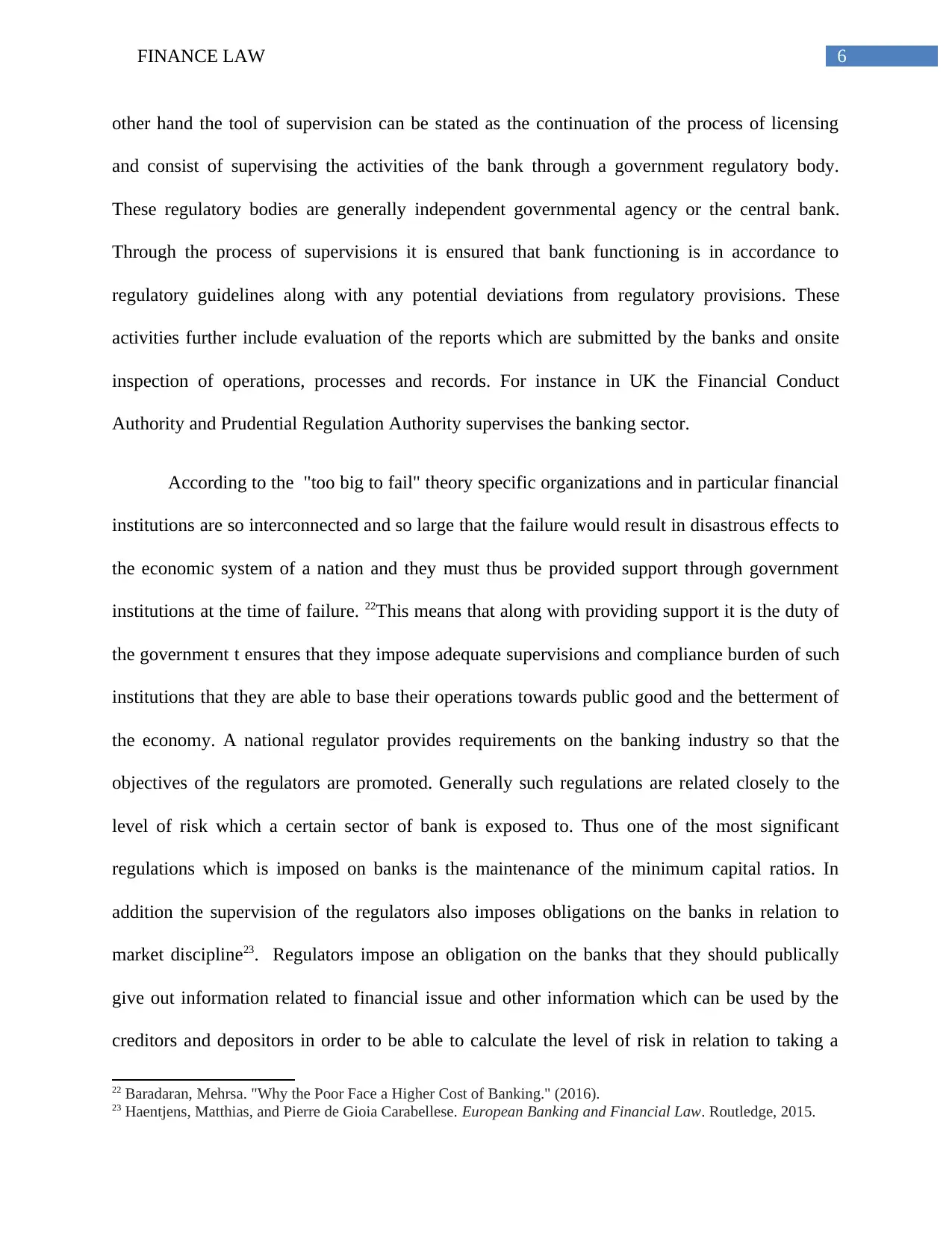
6FINANCE LAW
other hand the tool of supervision can be stated as the continuation of the process of licensing
and consist of supervising the activities of the bank through a government regulatory body.
These regulatory bodies are generally independent governmental agency or the central bank.
Through the process of supervisions it is ensured that bank functioning is in accordance to
regulatory guidelines along with any potential deviations from regulatory provisions. These
activities further include evaluation of the reports which are submitted by the banks and onsite
inspection of operations, processes and records. For instance in UK the Financial Conduct
Authority and Prudential Regulation Authority supervises the banking sector.
According to the "too big to fail" theory specific organizations and in particular financial
institutions are so interconnected and so large that the failure would result in disastrous effects to
the economic system of a nation and they must thus be provided support through government
institutions at the time of failure. 22This means that along with providing support it is the duty of
the government t ensures that they impose adequate supervisions and compliance burden of such
institutions that they are able to base their operations towards public good and the betterment of
the economy. A national regulator provides requirements on the banking industry so that the
objectives of the regulators are promoted. Generally such regulations are related closely to the
level of risk which a certain sector of bank is exposed to. Thus one of the most significant
regulations which is imposed on banks is the maintenance of the minimum capital ratios. In
addition the supervision of the regulators also imposes obligations on the banks in relation to
market discipline23. Regulators impose an obligation on the banks that they should publically
give out information related to financial issue and other information which can be used by the
creditors and depositors in order to be able to calculate the level of risk in relation to taking a
22 Baradaran, Mehrsa. "Why the Poor Face a Higher Cost of Banking." (2016).
23 Haentjens, Matthias, and Pierre de Gioia Carabellese. European Banking and Financial Law. Routledge, 2015.
other hand the tool of supervision can be stated as the continuation of the process of licensing
and consist of supervising the activities of the bank through a government regulatory body.
These regulatory bodies are generally independent governmental agency or the central bank.
Through the process of supervisions it is ensured that bank functioning is in accordance to
regulatory guidelines along with any potential deviations from regulatory provisions. These
activities further include evaluation of the reports which are submitted by the banks and onsite
inspection of operations, processes and records. For instance in UK the Financial Conduct
Authority and Prudential Regulation Authority supervises the banking sector.
According to the "too big to fail" theory specific organizations and in particular financial
institutions are so interconnected and so large that the failure would result in disastrous effects to
the economic system of a nation and they must thus be provided support through government
institutions at the time of failure. 22This means that along with providing support it is the duty of
the government t ensures that they impose adequate supervisions and compliance burden of such
institutions that they are able to base their operations towards public good and the betterment of
the economy. A national regulator provides requirements on the banking industry so that the
objectives of the regulators are promoted. Generally such regulations are related closely to the
level of risk which a certain sector of bank is exposed to. Thus one of the most significant
regulations which is imposed on banks is the maintenance of the minimum capital ratios. In
addition the supervision of the regulators also imposes obligations on the banks in relation to
market discipline23. Regulators impose an obligation on the banks that they should publically
give out information related to financial issue and other information which can be used by the
creditors and depositors in order to be able to calculate the level of risk in relation to taking a
22 Baradaran, Mehrsa. "Why the Poor Face a Higher Cost of Banking." (2016).
23 Haentjens, Matthias, and Pierre de Gioia Carabellese. European Banking and Financial Law. Routledge, 2015.
Paraphrase This Document
Need a fresh take? Get an instant paraphrase of this document with our AI Paraphraser
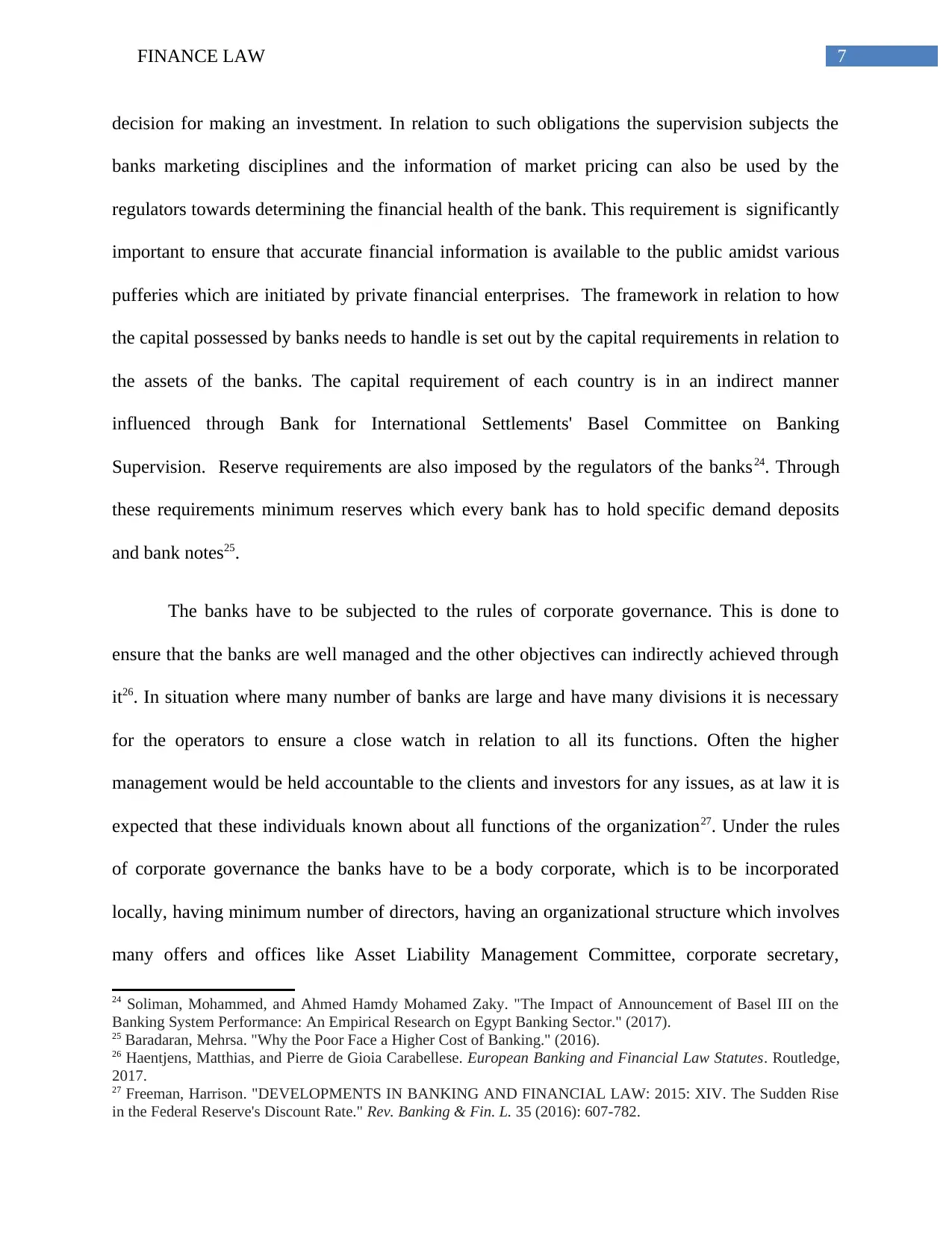
7FINANCE LAW
decision for making an investment. In relation to such obligations the supervision subjects the
banks marketing disciplines and the information of market pricing can also be used by the
regulators towards determining the financial health of the bank. This requirement is significantly
important to ensure that accurate financial information is available to the public amidst various
pufferies which are initiated by private financial enterprises. The framework in relation to how
the capital possessed by banks needs to handle is set out by the capital requirements in relation to
the assets of the banks. The capital requirement of each country is in an indirect manner
influenced through Bank for International Settlements' Basel Committee on Banking
Supervision. Reserve requirements are also imposed by the regulators of the banks24. Through
these requirements minimum reserves which every bank has to hold specific demand deposits
and bank notes25.
The banks have to be subjected to the rules of corporate governance. This is done to
ensure that the banks are well managed and the other objectives can indirectly achieved through
it26. In situation where many number of banks are large and have many divisions it is necessary
for the operators to ensure a close watch in relation to all its functions. Often the higher
management would be held accountable to the clients and investors for any issues, as at law it is
expected that these individuals known about all functions of the organization27. Under the rules
of corporate governance the banks have to be a body corporate, which is to be incorporated
locally, having minimum number of directors, having an organizational structure which involves
many offers and offices like Asset Liability Management Committee, corporate secretary,
24 Soliman, Mohammed, and Ahmed Hamdy Mohamed Zaky. "The Impact of Announcement of Basel III on the
Banking System Performance: An Empirical Research on Egypt Banking Sector." (2017).
25 Baradaran, Mehrsa. "Why the Poor Face a Higher Cost of Banking." (2016).
26 Haentjens, Matthias, and Pierre de Gioia Carabellese. European Banking and Financial Law Statutes. Routledge,
2017.
27 Freeman, Harrison. "DEVELOPMENTS IN BANKING AND FINANCIAL LAW: 2015: XIV. The Sudden Rise
in the Federal Reserve's Discount Rate." Rev. Banking & Fin. L. 35 (2016): 607-782.
decision for making an investment. In relation to such obligations the supervision subjects the
banks marketing disciplines and the information of market pricing can also be used by the
regulators towards determining the financial health of the bank. This requirement is significantly
important to ensure that accurate financial information is available to the public amidst various
pufferies which are initiated by private financial enterprises. The framework in relation to how
the capital possessed by banks needs to handle is set out by the capital requirements in relation to
the assets of the banks. The capital requirement of each country is in an indirect manner
influenced through Bank for International Settlements' Basel Committee on Banking
Supervision. Reserve requirements are also imposed by the regulators of the banks24. Through
these requirements minimum reserves which every bank has to hold specific demand deposits
and bank notes25.
The banks have to be subjected to the rules of corporate governance. This is done to
ensure that the banks are well managed and the other objectives can indirectly achieved through
it26. In situation where many number of banks are large and have many divisions it is necessary
for the operators to ensure a close watch in relation to all its functions. Often the higher
management would be held accountable to the clients and investors for any issues, as at law it is
expected that these individuals known about all functions of the organization27. Under the rules
of corporate governance the banks have to be a body corporate, which is to be incorporated
locally, having minimum number of directors, having an organizational structure which involves
many offers and offices like Asset Liability Management Committee, corporate secretary,
24 Soliman, Mohammed, and Ahmed Hamdy Mohamed Zaky. "The Impact of Announcement of Basel III on the
Banking System Performance: An Empirical Research on Egypt Banking Sector." (2017).
25 Baradaran, Mehrsa. "Why the Poor Face a Higher Cost of Banking." (2016).
26 Haentjens, Matthias, and Pierre de Gioia Carabellese. European Banking and Financial Law Statutes. Routledge,
2017.
27 Freeman, Harrison. "DEVELOPMENTS IN BANKING AND FINANCIAL LAW: 2015: XIV. The Sudden Rise
in the Federal Reserve's Discount Rate." Rev. Banking & Fin. L. 35 (2016): 607-782.
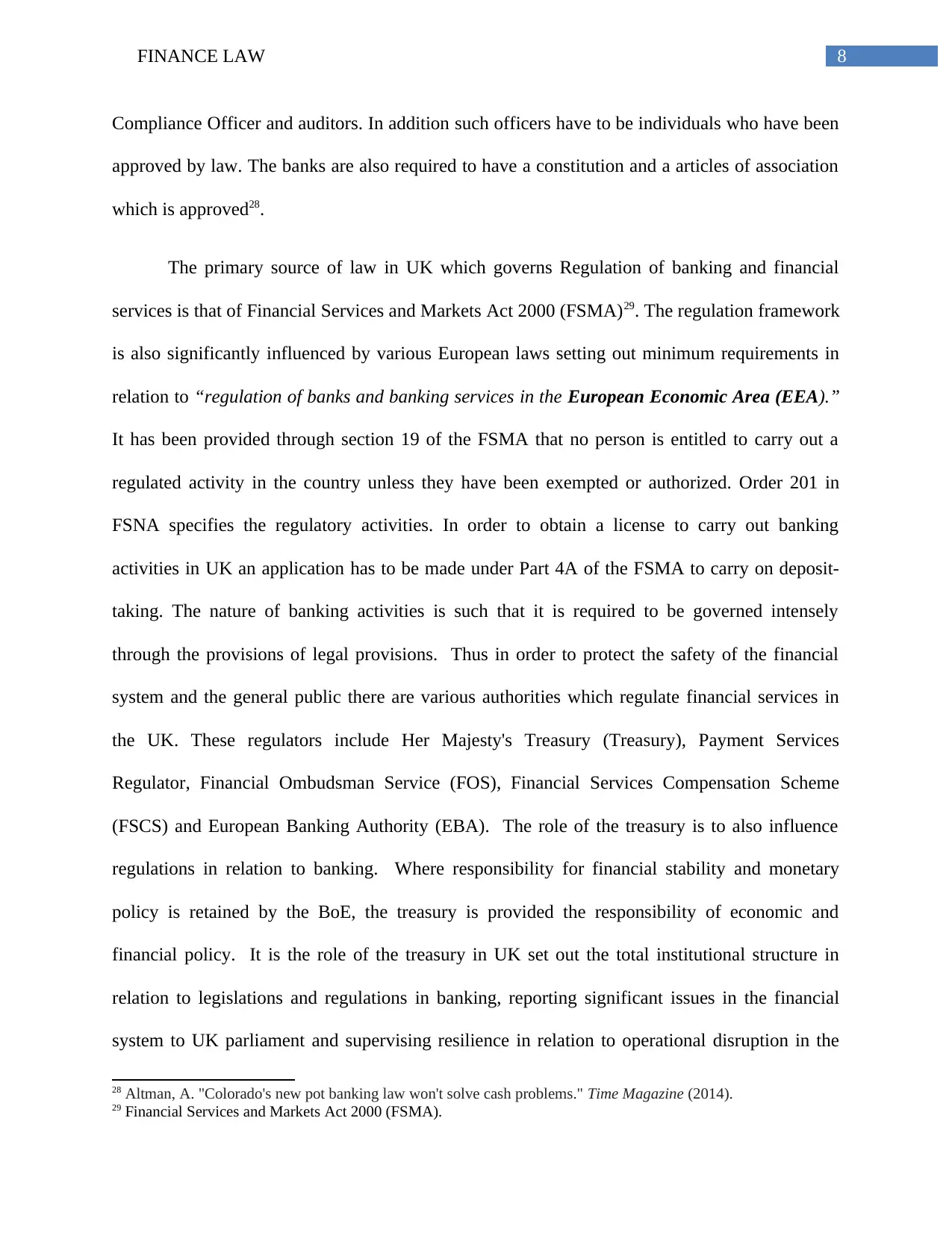
8FINANCE LAW
Compliance Officer and auditors. In addition such officers have to be individuals who have been
approved by law. The banks are also required to have a constitution and a articles of association
which is approved28.
The primary source of law in UK which governs Regulation of banking and financial
services is that of Financial Services and Markets Act 2000 (FSMA)29. The regulation framework
is also significantly influenced by various European laws setting out minimum requirements in
relation to “regulation of banks and banking services in the European Economic Area (EEA).”
It has been provided through section 19 of the FSMA that no person is entitled to carry out a
regulated activity in the country unless they have been exempted or authorized. Order 201 in
FSNA specifies the regulatory activities. In order to obtain a license to carry out banking
activities in UK an application has to be made under Part 4A of the FSMA to carry on deposit-
taking. The nature of banking activities is such that it is required to be governed intensely
through the provisions of legal provisions. Thus in order to protect the safety of the financial
system and the general public there are various authorities which regulate financial services in
the UK. These regulators include Her Majesty's Treasury (Treasury), Payment Services
Regulator, Financial Ombudsman Service (FOS), Financial Services Compensation Scheme
(FSCS) and European Banking Authority (EBA). The role of the treasury is to also influence
regulations in relation to banking. Where responsibility for financial stability and monetary
policy is retained by the BoE, the treasury is provided the responsibility of economic and
financial policy. It is the role of the treasury in UK set out the total institutional structure in
relation to legislations and regulations in banking, reporting significant issues in the financial
system to UK parliament and supervising resilience in relation to operational disruption in the
28 Altman, A. "Colorado's new pot banking law won't solve cash problems." Time Magazine (2014).
29 Financial Services and Markets Act 2000 (FSMA).
Compliance Officer and auditors. In addition such officers have to be individuals who have been
approved by law. The banks are also required to have a constitution and a articles of association
which is approved28.
The primary source of law in UK which governs Regulation of banking and financial
services is that of Financial Services and Markets Act 2000 (FSMA)29. The regulation framework
is also significantly influenced by various European laws setting out minimum requirements in
relation to “regulation of banks and banking services in the European Economic Area (EEA).”
It has been provided through section 19 of the FSMA that no person is entitled to carry out a
regulated activity in the country unless they have been exempted or authorized. Order 201 in
FSNA specifies the regulatory activities. In order to obtain a license to carry out banking
activities in UK an application has to be made under Part 4A of the FSMA to carry on deposit-
taking. The nature of banking activities is such that it is required to be governed intensely
through the provisions of legal provisions. Thus in order to protect the safety of the financial
system and the general public there are various authorities which regulate financial services in
the UK. These regulators include Her Majesty's Treasury (Treasury), Payment Services
Regulator, Financial Ombudsman Service (FOS), Financial Services Compensation Scheme
(FSCS) and European Banking Authority (EBA). The role of the treasury is to also influence
regulations in relation to banking. Where responsibility for financial stability and monetary
policy is retained by the BoE, the treasury is provided the responsibility of economic and
financial policy. It is the role of the treasury in UK set out the total institutional structure in
relation to legislations and regulations in banking, reporting significant issues in the financial
system to UK parliament and supervising resilience in relation to operational disruption in the
28 Altman, A. "Colorado's new pot banking law won't solve cash problems." Time Magazine (2014).
29 Financial Services and Markets Act 2000 (FSMA).
⊘ This is a preview!⊘
Do you want full access?
Subscribe today to unlock all pages.

Trusted by 1+ million students worldwide
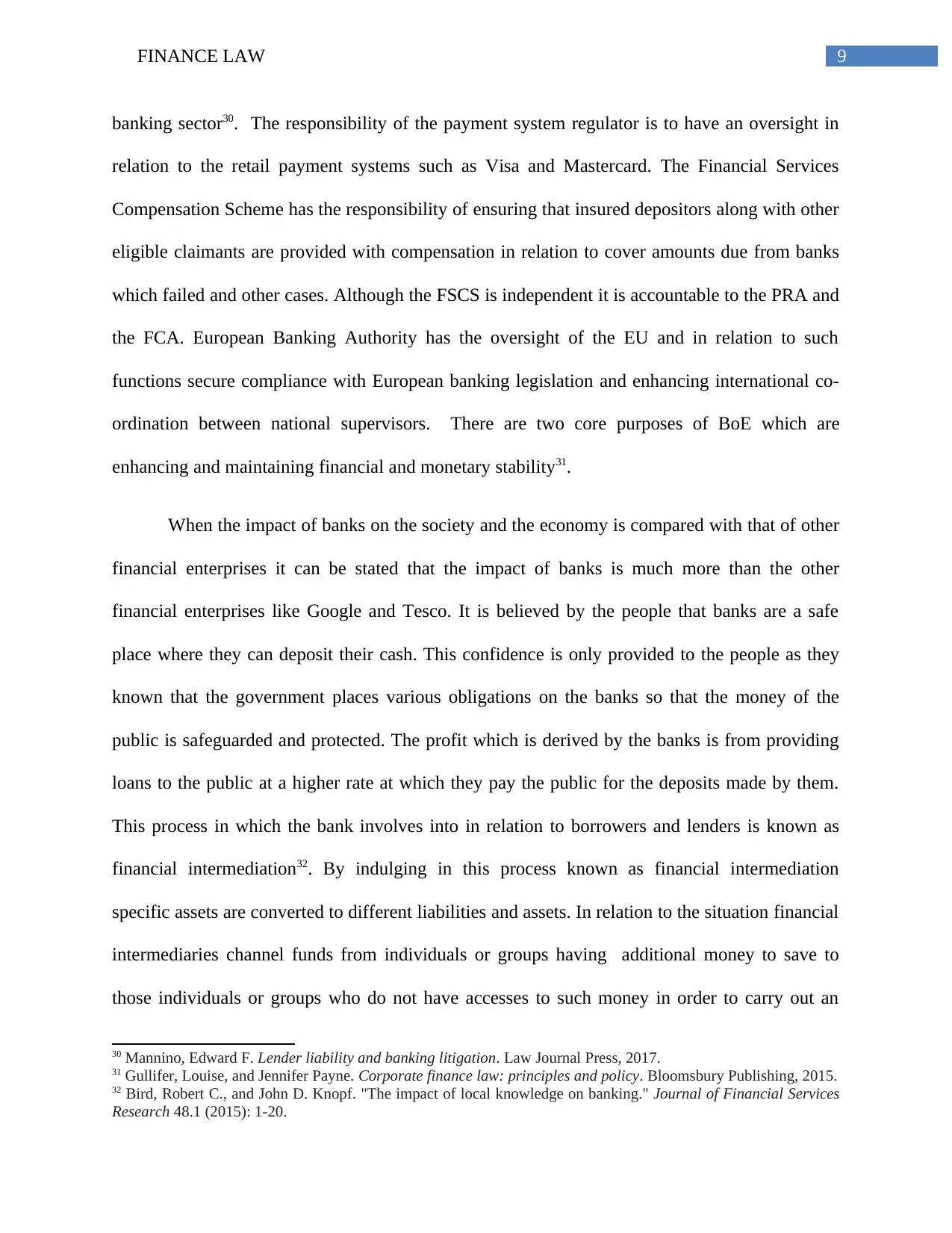
9FINANCE LAW
banking sector30. The responsibility of the payment system regulator is to have an oversight in
relation to the retail payment systems such as Visa and Mastercard. The Financial Services
Compensation Scheme has the responsibility of ensuring that insured depositors along with other
eligible claimants are provided with compensation in relation to cover amounts due from banks
which failed and other cases. Although the FSCS is independent it is accountable to the PRA and
the FCA. European Banking Authority has the oversight of the EU and in relation to such
functions secure compliance with European banking legislation and enhancing international co-
ordination between national supervisors. There are two core purposes of BoE which are
enhancing and maintaining financial and monetary stability31.
When the impact of banks on the society and the economy is compared with that of other
financial enterprises it can be stated that the impact of banks is much more than the other
financial enterprises like Google and Tesco. It is believed by the people that banks are a safe
place where they can deposit their cash. This confidence is only provided to the people as they
known that the government places various obligations on the banks so that the money of the
public is safeguarded and protected. The profit which is derived by the banks is from providing
loans to the public at a higher rate at which they pay the public for the deposits made by them.
This process in which the bank involves into in relation to borrowers and lenders is known as
financial intermediation32. By indulging in this process known as financial intermediation
specific assets are converted to different liabilities and assets. In relation to the situation financial
intermediaries channel funds from individuals or groups having additional money to save to
those individuals or groups who do not have accesses to such money in order to carry out an
30 Mannino, Edward F. Lender liability and banking litigation. Law Journal Press, 2017.
31 Gullifer, Louise, and Jennifer Payne. Corporate finance law: principles and policy. Bloomsbury Publishing, 2015.
32 Bird, Robert C., and John D. Knopf. "The impact of local knowledge on banking." Journal of Financial Services
Research 48.1 (2015): 1-20.
banking sector30. The responsibility of the payment system regulator is to have an oversight in
relation to the retail payment systems such as Visa and Mastercard. The Financial Services
Compensation Scheme has the responsibility of ensuring that insured depositors along with other
eligible claimants are provided with compensation in relation to cover amounts due from banks
which failed and other cases. Although the FSCS is independent it is accountable to the PRA and
the FCA. European Banking Authority has the oversight of the EU and in relation to such
functions secure compliance with European banking legislation and enhancing international co-
ordination between national supervisors. There are two core purposes of BoE which are
enhancing and maintaining financial and monetary stability31.
When the impact of banks on the society and the economy is compared with that of other
financial enterprises it can be stated that the impact of banks is much more than the other
financial enterprises like Google and Tesco. It is believed by the people that banks are a safe
place where they can deposit their cash. This confidence is only provided to the people as they
known that the government places various obligations on the banks so that the money of the
public is safeguarded and protected. The profit which is derived by the banks is from providing
loans to the public at a higher rate at which they pay the public for the deposits made by them.
This process in which the bank involves into in relation to borrowers and lenders is known as
financial intermediation32. By indulging in this process known as financial intermediation
specific assets are converted to different liabilities and assets. In relation to the situation financial
intermediaries channel funds from individuals or groups having additional money to save to
those individuals or groups who do not have accesses to such money in order to carry out an
30 Mannino, Edward F. Lender liability and banking litigation. Law Journal Press, 2017.
31 Gullifer, Louise, and Jennifer Payne. Corporate finance law: principles and policy. Bloomsbury Publishing, 2015.
32 Bird, Robert C., and John D. Knopf. "The impact of local knowledge on banking." Journal of Financial Services
Research 48.1 (2015): 1-20.
Paraphrase This Document
Need a fresh take? Get an instant paraphrase of this document with our AI Paraphraser
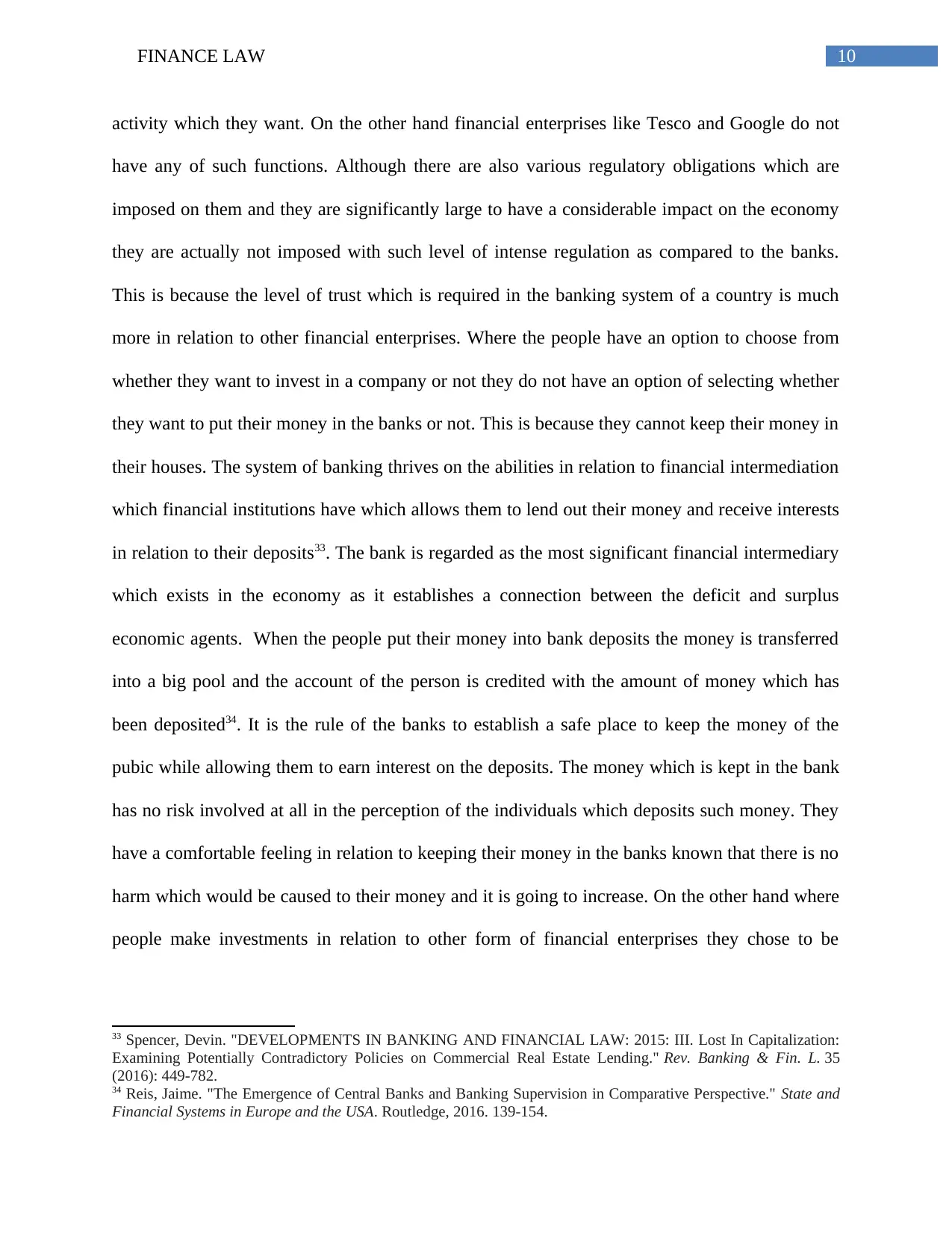
10FINANCE LAW
activity which they want. On the other hand financial enterprises like Tesco and Google do not
have any of such functions. Although there are also various regulatory obligations which are
imposed on them and they are significantly large to have a considerable impact on the economy
they are actually not imposed with such level of intense regulation as compared to the banks.
This is because the level of trust which is required in the banking system of a country is much
more in relation to other financial enterprises. Where the people have an option to choose from
whether they want to invest in a company or not they do not have an option of selecting whether
they want to put their money in the banks or not. This is because they cannot keep their money in
their houses. The system of banking thrives on the abilities in relation to financial intermediation
which financial institutions have which allows them to lend out their money and receive interests
in relation to their deposits33. The bank is regarded as the most significant financial intermediary
which exists in the economy as it establishes a connection between the deficit and surplus
economic agents. When the people put their money into bank deposits the money is transferred
into a big pool and the account of the person is credited with the amount of money which has
been deposited34. It is the rule of the banks to establish a safe place to keep the money of the
pubic while allowing them to earn interest on the deposits. The money which is kept in the bank
has no risk involved at all in the perception of the individuals which deposits such money. They
have a comfortable feeling in relation to keeping their money in the banks known that there is no
harm which would be caused to their money and it is going to increase. On the other hand where
people make investments in relation to other form of financial enterprises they chose to be
33 Spencer, Devin. "DEVELOPMENTS IN BANKING AND FINANCIAL LAW: 2015: III. Lost In Capitalization:
Examining Potentially Contradictory Policies on Commercial Real Estate Lending." Rev. Banking & Fin. L. 35
(2016): 449-782.
34 Reis, Jaime. "The Emergence of Central Banks and Banking Supervision in Comparative Perspective." State and
Financial Systems in Europe and the USA. Routledge, 2016. 139-154.
activity which they want. On the other hand financial enterprises like Tesco and Google do not
have any of such functions. Although there are also various regulatory obligations which are
imposed on them and they are significantly large to have a considerable impact on the economy
they are actually not imposed with such level of intense regulation as compared to the banks.
This is because the level of trust which is required in the banking system of a country is much
more in relation to other financial enterprises. Where the people have an option to choose from
whether they want to invest in a company or not they do not have an option of selecting whether
they want to put their money in the banks or not. This is because they cannot keep their money in
their houses. The system of banking thrives on the abilities in relation to financial intermediation
which financial institutions have which allows them to lend out their money and receive interests
in relation to their deposits33. The bank is regarded as the most significant financial intermediary
which exists in the economy as it establishes a connection between the deficit and surplus
economic agents. When the people put their money into bank deposits the money is transferred
into a big pool and the account of the person is credited with the amount of money which has
been deposited34. It is the rule of the banks to establish a safe place to keep the money of the
pubic while allowing them to earn interest on the deposits. The money which is kept in the bank
has no risk involved at all in the perception of the individuals which deposits such money. They
have a comfortable feeling in relation to keeping their money in the banks known that there is no
harm which would be caused to their money and it is going to increase. On the other hand where
people make investments in relation to other form of financial enterprises they chose to be
33 Spencer, Devin. "DEVELOPMENTS IN BANKING AND FINANCIAL LAW: 2015: III. Lost In Capitalization:
Examining Potentially Contradictory Policies on Commercial Real Estate Lending." Rev. Banking & Fin. L. 35
(2016): 449-782.
34 Reis, Jaime. "The Emergence of Central Banks and Banking Supervision in Comparative Perspective." State and
Financial Systems in Europe and the USA. Routledge, 2016. 139-154.
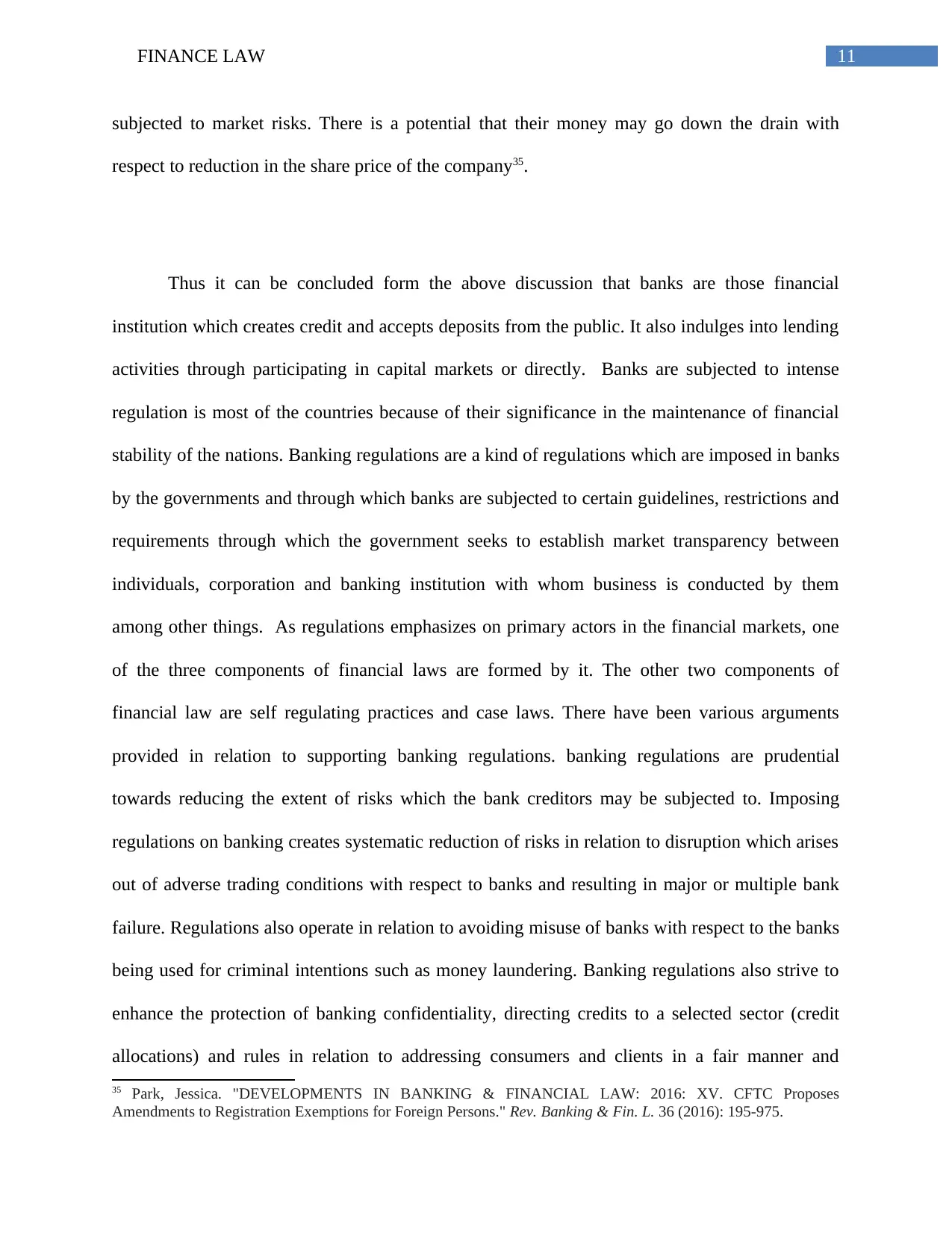
11FINANCE LAW
subjected to market risks. There is a potential that their money may go down the drain with
respect to reduction in the share price of the company35.
Thus it can be concluded form the above discussion that banks are those financial
institution which creates credit and accepts deposits from the public. It also indulges into lending
activities through participating in capital markets or directly. Banks are subjected to intense
regulation is most of the countries because of their significance in the maintenance of financial
stability of the nations. Banking regulations are a kind of regulations which are imposed in banks
by the governments and through which banks are subjected to certain guidelines, restrictions and
requirements through which the government seeks to establish market transparency between
individuals, corporation and banking institution with whom business is conducted by them
among other things. As regulations emphasizes on primary actors in the financial markets, one
of the three components of financial laws are formed by it. The other two components of
financial law are self regulating practices and case laws. There have been various arguments
provided in relation to supporting banking regulations. banking regulations are prudential
towards reducing the extent of risks which the bank creditors may be subjected to. Imposing
regulations on banking creates systematic reduction of risks in relation to disruption which arises
out of adverse trading conditions with respect to banks and resulting in major or multiple bank
failure. Regulations also operate in relation to avoiding misuse of banks with respect to the banks
being used for criminal intentions such as money laundering. Banking regulations also strive to
enhance the protection of banking confidentiality, directing credits to a selected sector (credit
allocations) and rules in relation to addressing consumers and clients in a fair manner and
35 Park, Jessica. "DEVELOPMENTS IN BANKING & FINANCIAL LAW: 2016: XV. CFTC Proposes
Amendments to Registration Exemptions for Foreign Persons." Rev. Banking & Fin. L. 36 (2016): 195-975.
subjected to market risks. There is a potential that their money may go down the drain with
respect to reduction in the share price of the company35.
Thus it can be concluded form the above discussion that banks are those financial
institution which creates credit and accepts deposits from the public. It also indulges into lending
activities through participating in capital markets or directly. Banks are subjected to intense
regulation is most of the countries because of their significance in the maintenance of financial
stability of the nations. Banking regulations are a kind of regulations which are imposed in banks
by the governments and through which banks are subjected to certain guidelines, restrictions and
requirements through which the government seeks to establish market transparency between
individuals, corporation and banking institution with whom business is conducted by them
among other things. As regulations emphasizes on primary actors in the financial markets, one
of the three components of financial laws are formed by it. The other two components of
financial law are self regulating practices and case laws. There have been various arguments
provided in relation to supporting banking regulations. banking regulations are prudential
towards reducing the extent of risks which the bank creditors may be subjected to. Imposing
regulations on banking creates systematic reduction of risks in relation to disruption which arises
out of adverse trading conditions with respect to banks and resulting in major or multiple bank
failure. Regulations also operate in relation to avoiding misuse of banks with respect to the banks
being used for criminal intentions such as money laundering. Banking regulations also strive to
enhance the protection of banking confidentiality, directing credits to a selected sector (credit
allocations) and rules in relation to addressing consumers and clients in a fair manner and
35 Park, Jessica. "DEVELOPMENTS IN BANKING & FINANCIAL LAW: 2016: XV. CFTC Proposes
Amendments to Registration Exemptions for Foreign Persons." Rev. Banking & Fin. L. 36 (2016): 195-975.
⊘ This is a preview!⊘
Do you want full access?
Subscribe today to unlock all pages.

Trusted by 1+ million students worldwide
1 out of 16
Related Documents
Your All-in-One AI-Powered Toolkit for Academic Success.
+13062052269
info@desklib.com
Available 24*7 on WhatsApp / Email
![[object Object]](/_next/static/media/star-bottom.7253800d.svg)
Unlock your academic potential
Copyright © 2020–2026 A2Z Services. All Rights Reserved. Developed and managed by ZUCOL.





